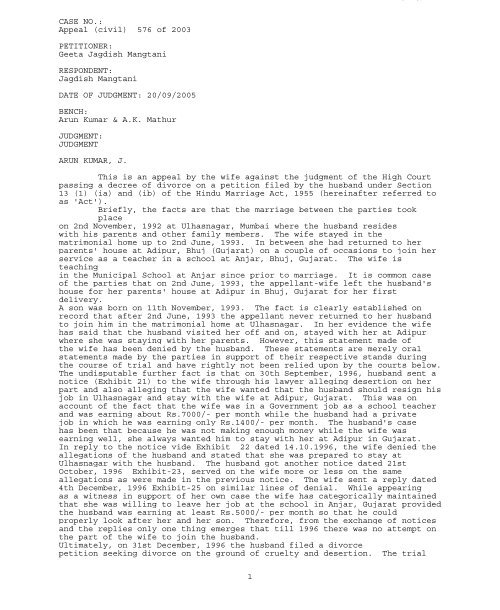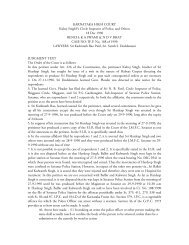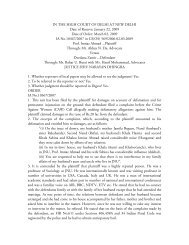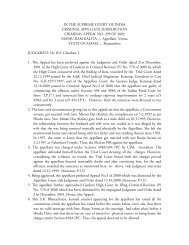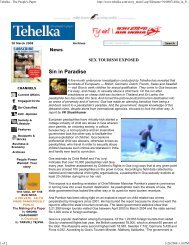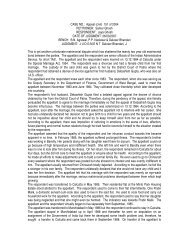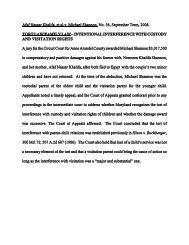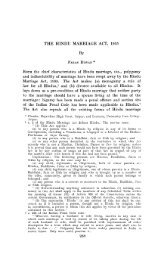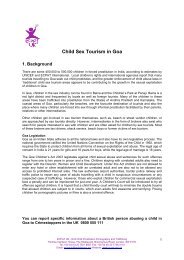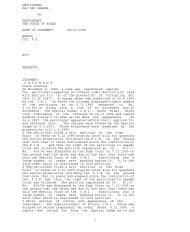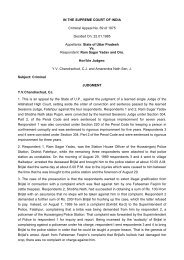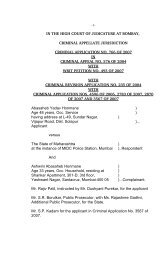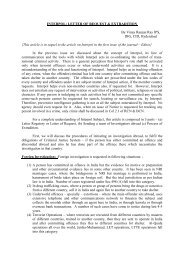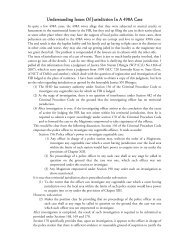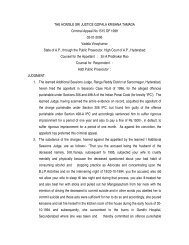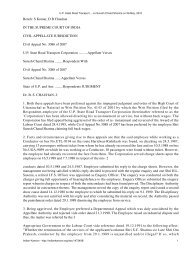Document1 4/15/2007 CASE NO.: Appeal (civil) 576 of ... - IPC 498A
Document1 4/15/2007 CASE NO.: Appeal (civil) 576 of ... - IPC 498A
Document1 4/15/2007 CASE NO.: Appeal (civil) 576 of ... - IPC 498A
You also want an ePaper? Increase the reach of your titles
YUMPU automatically turns print PDFs into web optimized ePapers that Google loves.
<strong>CASE</strong> <strong>NO</strong>.:<br />
<strong>Appeal</strong> (<strong>civil</strong>) <strong>576</strong> <strong>of</strong> 2003<br />
PETITIONER:<br />
Geeta Jagdish Mangtani<br />
RESPONDENT:<br />
Jagdish Mangtani<br />
DATE OF JUDGMENT: 20/09/2005<br />
BENCH:<br />
Arun Kumar & A.K. Mathur<br />
JUDGMENT:<br />
JUDGMENT<br />
ARUN KUMAR, J.<br />
This is an appeal by the wife against the judgment <strong>of</strong> the High Court<br />
passing a decree <strong>of</strong> divorce on a petition filed by the husband under Section<br />
13 (1) (ia) and (ib) <strong>of</strong> the Hindu Marriage Act, 1955 (hereinafter referred to<br />
as 'Act').<br />
Briefly, the facts are that the marriage between the parties took<br />
place<br />
on 2nd November, 1992 at Ulhasnagar, Mumbai where the husband resides<br />
with his parents and other family members. The wife stayed in the<br />
matrimonial home up to 2nd June, 1993. In between she had returned to her<br />
parents' house at Adipur, Bhuj (Gujarat) on a couple <strong>of</strong> occasions to join her<br />
service as a teacher in a school at Anjar, Bhuj, Gujarat. The wife is<br />
teaching<br />
in the Municipal School at Anjar since prior to marriage. It is common case<br />
<strong>of</strong> the parties that on 2nd June, 1993, the appellant-wife left the husband's<br />
house for her parents' house at Adipur in Bhuj, Gujarat for her first<br />
delivery.<br />
A son was born on 11th November, 1993. The fact is clearly established on<br />
record that after 2nd June, 1993 the appellant never returned to her husband<br />
to join him in the matrimonial home at Ulhasnagar. In her evidence the wife<br />
has said that the husband visited her <strong>of</strong>f and on, stayed with her at Adipur<br />
where she was staying with her parents. However, this statement made <strong>of</strong><br />
the wife has been denied by the husband. These statements are merely oral<br />
statements made by the parties in support <strong>of</strong> their respective stands during<br />
the course <strong>of</strong> trial and have rightly not been relied upon by the courts below.<br />
The undisputable further fact is that on 30th September, 1996, husband sent a<br />
notice (Exhibit 21) to the wife through his lawyer alleging desertion on her<br />
part and also alleging that the wife wanted that the husband should resign his<br />
job in Ulhasnagar and stay with the wife at Adipur, Gujarat. This was on<br />
account <strong>of</strong> the fact that the wife was in a Government job as a school teacher<br />
and was earning about Rs.7000/- per month while the husband had a private<br />
job in which he was earning only Rs.1400/- per month. The husband's case<br />
has been that because he was not making enough money while the wife was<br />
earning well, she always wanted him to stay with her at Adipur in Gujarat.<br />
In reply to the notice vide Exhibit 22 dated 14.10.1996, the wife denied the<br />
allegations <strong>of</strong> the husband and stated that she was prepared to stay at<br />
Ulhasnagar with the husband. The husband got another notice dated 21st<br />
October, 1996 Exhibit-23, served on the wife more or less on the same<br />
allegations as were made in the previous notice. The wife sent a reply dated<br />
4th December, 1996 Exhibit-25 on similar lines <strong>of</strong> denial. While appearing<br />
as a witness in support <strong>of</strong> her own case the wife has categorically maintained<br />
that she was willing to leave her job at the school in Anjar, Gujarat provided<br />
the husband was earning at least Rs.5000/- per month so that he could<br />
properly look after her and her son. Therefore, from the exchange <strong>of</strong> notices<br />
and the replies only one thing emerges that till 1996 there was no attempt on<br />
the part <strong>of</strong> the wife to join the husband.<br />
Ultimately, on 31st December, 1996 the husband filed a divorce<br />
petition seeking divorce on the ground <strong>of</strong> cruelty and desertion.<br />
The trial<br />
1
court after recording evidence accepted both the grounds and granted a<br />
decree <strong>of</strong> divorce. However, on an appeal filed by the wife, the lower<br />
Appellate Court reversed the judgment <strong>of</strong> the trial Court and dismissed the<br />
divorce petition filed by the husband. The husband appealed to the High<br />
Court against the said order. The High court by the judgment which is under<br />
challenge in this appeal confirmed the decree <strong>of</strong> divorce granted by the trial<br />
Court but only on the ground <strong>of</strong> desertion as the ground <strong>of</strong> cruelty was not<br />
pressed on behalf <strong>of</strong> the husband before the High Court. It is apparent from<br />
the judgment <strong>of</strong> the High court that the learned Judge made various attempts<br />
to bring about a settlement between the parties but he failed. This is noted<br />
by the learned Judge that both the parties appear to be adamant regarding<br />
their respective stands, that is, the wife is not prepared to leave her hob at<br />
Anjar in Gujarat unless the husband is able to earn a handsome salary at<br />
Ulhasnagar where he stays with his parents and other family members.<br />
Likewise, the husband is not willing to leave his present job and stay with<br />
the wife at Adipur, a place near Anjar in Gujarat where she is teaching. It<br />
may be mentioned here that at Adipur, the wife stays with her parents, the<br />
son <strong>of</strong> the parties is also with the wife.<br />
The husband has made allegation that after the birth <strong>of</strong> the son he had<br />
gone to the house <strong>of</strong> the wife at Adipur, Gujarat where he was not allowed to<br />
meet her nor he was allowed to see his son. Likewise, the wife has made<br />
allegations that her mother-in-law had made dowry related demands from<br />
her. These are mere allegations and counter allegations on which reliance<br />
cannot be placed. Nothing <strong>of</strong> this kind was stated in the notices or replies<br />
thereto. The most important fact which emerges is that from 2nd June, 1993,<br />
the parties have been staying separately and there is total lack <strong>of</strong> any effort<br />
on their part to stay together. Since the wife left the matrimonial home on<br />
2nd June, 1993 and has, admittedly, not returned to the said home, the<br />
absence <strong>of</strong> any desire on her part to honour the matrimonial obligation is<br />
clear. In this connection the observation <strong>of</strong> the High Court is worth<br />
reproduction:<br />
"..Both husband and wife have renounced the<br />
relationship as husband and wife since June, 1993 and<br />
from the record <strong>of</strong> the case also presently the questions<br />
which I have asked in the chamber. I am satisfied that<br />
both husband and wife had no intention to live together<br />
as husband and wife and decided to break <strong>of</strong>f from the<br />
relationship <strong>of</strong> marriage or withdraw that companionship<br />
<strong>of</strong> husband and wife. Desertion means rejection by the<br />
party <strong>of</strong> all the obligations <strong>of</strong> marriage and permanent<br />
forsaking or abandonment <strong>of</strong> one spouse by the other<br />
without any reasonable cause and without the consent <strong>of</strong><br />
the other."<br />
"14.7 I have considered the entire aspect and there is no<br />
useful purpose to have kept the parties as husband and<br />
wife particularly from 1993 both husband and wife have<br />
not stayed together. Though I have made efforts to see<br />
that wife can go to her matrimonial home at Mumbai or<br />
husband can stay at Gandhidham but unfortunately this<br />
Court's effort to reunite them as husband and wife failed.<br />
This Court has therefore no alternative but to pass the<br />
order for divorce to see that both people can be free to<br />
have their own houses in this behalf because to keep both<br />
husband and wife when one stays at Mumbai and another<br />
at Gandhidham, without intention to stay together, would<br />
serve no purpose. Therefore, the marriage is completely<br />
broken down and no useful purpose would be served by<br />
dismissing the Second <strong>Appeal</strong>."<br />
We are <strong>of</strong> the view that these observations <strong>of</strong> the High Court are fully<br />
justified in the facts <strong>of</strong> the present case. One has to particularly note the<br />
fact<br />
that the parties knew even prior to marriage whatever they were earning.<br />
The earnings <strong>of</strong> the wife from a Government job before the marriage was<br />
more than double <strong>of</strong> that <strong>of</strong> the husband. With the knowledge <strong>of</strong> this fact the<br />
2
parties entered into matrimonial alliance. The marriage survived only for a<br />
brief period <strong>of</strong> about seven months. After 2nd June, 1993 till the exchange <strong>of</strong><br />
notices and replies during September to December, 1996 and filing <strong>of</strong> the<br />
divorce petition ultimately by the husband on 31st December, 1996, there has<br />
been no attempt on the part <strong>of</strong> the wife to stay with the husband. She is a<br />
school teacher and it is common knowledge that in schools there are long<br />
vacations during summer months, more so, in Government schools where<br />
the wife teaches. At least during those holidays she could have visited the<br />
husband at Ulhasnagar alongwith her son and stayed with him. There is<br />
nothing on record to show that any such attempt was ever made by her to<br />
visit the husband during this entire period. She has stated in her evidence<br />
that the husband used to come and stay with her during her vacations. This<br />
has been denied by the husband. Therefore, the conclusion in inevitable,<br />
that there was never any attempt on the part <strong>of</strong> the wife to go to husband's<br />
house i.e., matrimonial home <strong>of</strong> the parties after she left on 2nd June, 1993.<br />
From this fact alone animus deserendi on the part <strong>of</strong> the wife is clearly<br />
established. She has chosen to adopt a course <strong>of</strong> conduct which proves<br />
desertion on her part. In the facts and circumstances <strong>of</strong> the case, it cannot<br />
be<br />
said that this desertion on the part <strong>of</strong> the wife was with a reasonable cause.<br />
Such a course <strong>of</strong> conduct over a long period indicates total abandonment <strong>of</strong><br />
marriage and cannot be justified on ground <strong>of</strong> monetary consideration alone<br />
as a reasonable cause to desert. It also amounts to willful neglect <strong>of</strong> the<br />
husband by the wife. Therefore, the conclusion reached by the High Court<br />
appears to be absolutely correct in the facts and circumstances <strong>of</strong> the case.<br />
This appeal is accordingly dismissed with no order as to costs.<br />
3


